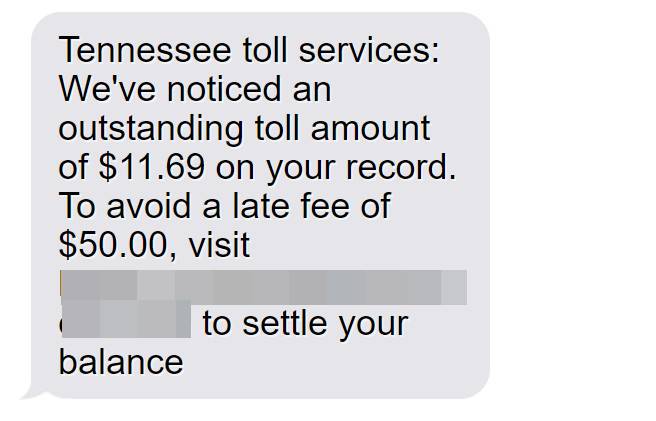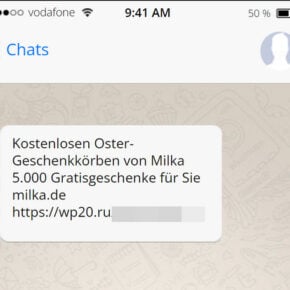Got an urgent text insisting you owe Tennessee toll money? Don’t race to pay – it’s likely a scam designed to fleece you! Digital deception related to fake toll debts is sweeping the state. Fraudsters pose as bogus “Tennessee Toll Services” to panic drivers into immediate payment, but it’s complete trickery aimed at stealing your money and identity.
This comprehensive guide will unpack their crafty tactics so you can cruise past these thieves seeking easy targets on Tennessee roadways. Buckle up – I’ll reveal what to watch for so you don’t get taken for a ride or forced into an expensive detour!

Scam Overview
This deception takes advantage of the countless drivers who depend on toll roads for travel all across Tennessee. Whether commuting daily for work or just passing through, tollways are essential arteries many rely on.
Criminals are capitalizing on this by impersonating a completely fabricated entity called “Tennessee Toll Services” in order to defraud residents. Victims receive an unsolicited text message insisting they have unpaid toll charges requiring immediate payment to avoid substantial late fees upwards of $50 or more.
The texts cite an oddly specific supposed outstanding toll amount, like $11.69 for example, and provide a link to hastily settle this fictional “debt” before penalties kick in. However, no such unpaid toll actually exists whatsoever.
The urgent threats of steep fines for delayed payment are pure fiction as well, invented solely to panic recipients into hasty action without deeper scrutiny. Even the name “Tennessee Toll Services” itself is an outright fake, carefully crafted to sound like a legitimate state agency.
In frantic desperation to avoid the imminent and severe late fees described in alarming detail, users click the provided link, which leads not to any valid state website but instead to sophisticated phony portals designed explicitly for stealing personal information and payment credentials.
These fraudulent sites are engineered by scammers to closely resemble official Tennessee government online platforms, incorporating branding, colors, logos and graphics used by the state to help suspend disbelief. But it’s just digital smoke and mirrors masking the criminals’ true motives.
After getting tricked into inputting sensitive personal details, users are shown a convincing mock-up invoice for the exact bogus toll amount first cited in the scam text message. Oftentimes an additional fictional “late fee” is tacked on, sometimes $50 or more, to intensify urgency.
Next, victims are instructed to enter credit card or bank account information to clear this imaginary toll balance immediately, at which point scammers capture financial data for misuse while the user remains unaware.
No money goes to pay any actual Tennessee tolls, which never existed in the first place. The oddly specific fictional toll amounts are purely to subconsciously feel more realistic, as most genuine tolls end up rounded numbers.
In reality, scammers simply pocket ill-gotten gains and identities from those deceived by this toll payment ruse and the air of legitimacy woven throughout it. Don’t let them take you for a ride on Tennessee’s many toll roads. Stay vigilant and protect your details.
How the Tennessee Toll Scam Unfolds
From the initial text to the deceptive web portal, here’s an inside look at how they finagle and fleece their victims:
1. The Text Message
You’ll get a text from a local number saying you owe toll money and face fees if unpaid quickly. It cites an odd-specific amount due and a link to pay before penalties:
“Tennessee Toll Services: We’ve noticed an outstanding toll amount of $11.69 on your record. To avoid a late fee of $50, visit https://tennesseetollservices.com to settle your balance.”
The short deadline, steep fine, and shady link are red flags. Legitimate toll agencies don’t operate this way.
2. Visiting the Fake Website
Clicking the link takes you to an sophisticated phony website made to look like a real Tennessee toll payment portal. You’ll be prompted to enter personal details which allows scammers to steal identities.
3. Entering Payment Information
Next, you’ll see a false invoice for the exact unpaid toll amount stated in the initial text, usually with fictional penalties added. You’ll be told to enter payment info to pay this bogus bill. Scammers steal your financial data while your identity remains at risk.
No money goes to pay real tolls, which were fabricated. Scammers pocket your details and move to the next target. Don’t let them take you for a ride!
What to Do If You Are Scammed
If you got tricked, take these steps immediately to minimize damages:
- Contact your bank to halt payments and contest unauthorized charges. Monitor closely for more suspicious activity.
- Put fraud alerts on credit reports and consider credit monitoring to catch misuse of your identity.
- Report it to the FTC, FBI, and Tennessee AG.
- Change account passwords, especially if reused on the phony site.
- Avoid further engagement with scammers who now have your info. Block their numbers.
- Contact toll agencies directly to ask about any legitimate unpaid tolls.
- Spread awareness to help prevent others from being swindled too.
Quick action can help reduce impacts from compromised finances or stolen personal data. Use the misstep as motivation for honing your scam prevention skills.
Frequently Asked Questions about the Tennessee Toll Scam Text
1. What is the Tennessee Toll Services scam text message?
The Tennessee Toll Services scam text involves scammers sending fraudulent text messages claiming to be from Tennessee Toll Services. The texts demand immediate payment for fake unpaid tolls to avoid fictional late fees. Their links go to phony websites designed to steal personal and financial information.
2. Who are the text messages from?
The texts are not from any real Tennessee toll agency. “Tennessee Toll Services” is a completely fabricated name that scammers use to execute this fraud.
3. What details do the scam texts include?
The texts cite a specific unpaid toll amount owed, threats of high fake fees, and links to fraudulent websites dressed up to mimic official portals.
4. How can I recognize the Tennessee toll scam text?
Warning signs include getting unsolicited texts about unpaid tolls, steep late fees, links to questionable sites, requests for your personal info, and pressure to pay immediately.
5. What keywords should raise red flags?
Phrases like “Tennessee Toll Services,” “outstanding toll,” “late fee,” and links to unfamiliar sites are red flags. Legitimate toll agencies do not contact you this way.
6. Are there sender IDs I can look out for?
The texts come from a variety of changing local numbers. Scammers often spoof caller IDs to appear credible. There are no specific numbers that always signal this scam.
7. How can I avoid this Tennessee toll scam text?
Do not click on links in questionable texts about tolls. Contact official toll agencies directly if you have toll questions. Only pay tolls through your real account on official .gov websites.
8. What should I do if I get a suspicious text?
If you get a shady toll-related text, do not click the link or call the number. Report the scam to the FTC and Tennessee AG. Call toll agencies directly using official numbers to inquire.
9. How can I safely pay any legitimate tolls?
Log into your account on official .gov toll websites. Use real online or phone payment options only. Never pay toll bills on third-party sites, especially ones sent unexpectedly via text.
10. What should I do if I paid a fake toll bill?
If you shared information or paid, contact your credit card company right away to dispute the charges. Also place fraud alerts, monitor your statements, change account passwords, and contact the FTC.
11. How can I get my money back if I paid a scam toll bill?
Unfortunately it is very difficult to recover money sent to scammers. File disputes with your bank and monitor for identity theft. Use extreme caution with all money transfer or data sharing requests moving forward.
12. How can I protect myself from identity theft if scammed?
If your information was compromised, enroll in credit monitoring services to detect misuse. Freeze credit reports if warranted. Continue monitoring accounts closely for any fraudulent activity and report it immediately.
Conclusion
The “Tennessee Toll Services” scam text exploits familiarity with toll roads to defraud drivers. Stay vigilant against texts insisting on rushed toll payment and threatening unrealistic fees. Verify real toll agencies through official channels only. Together we can stop these tech-savvy thieves in their tracks before more innocent commuters get taken for a ride. With increased awareness, we can outsmart these hustlers.


